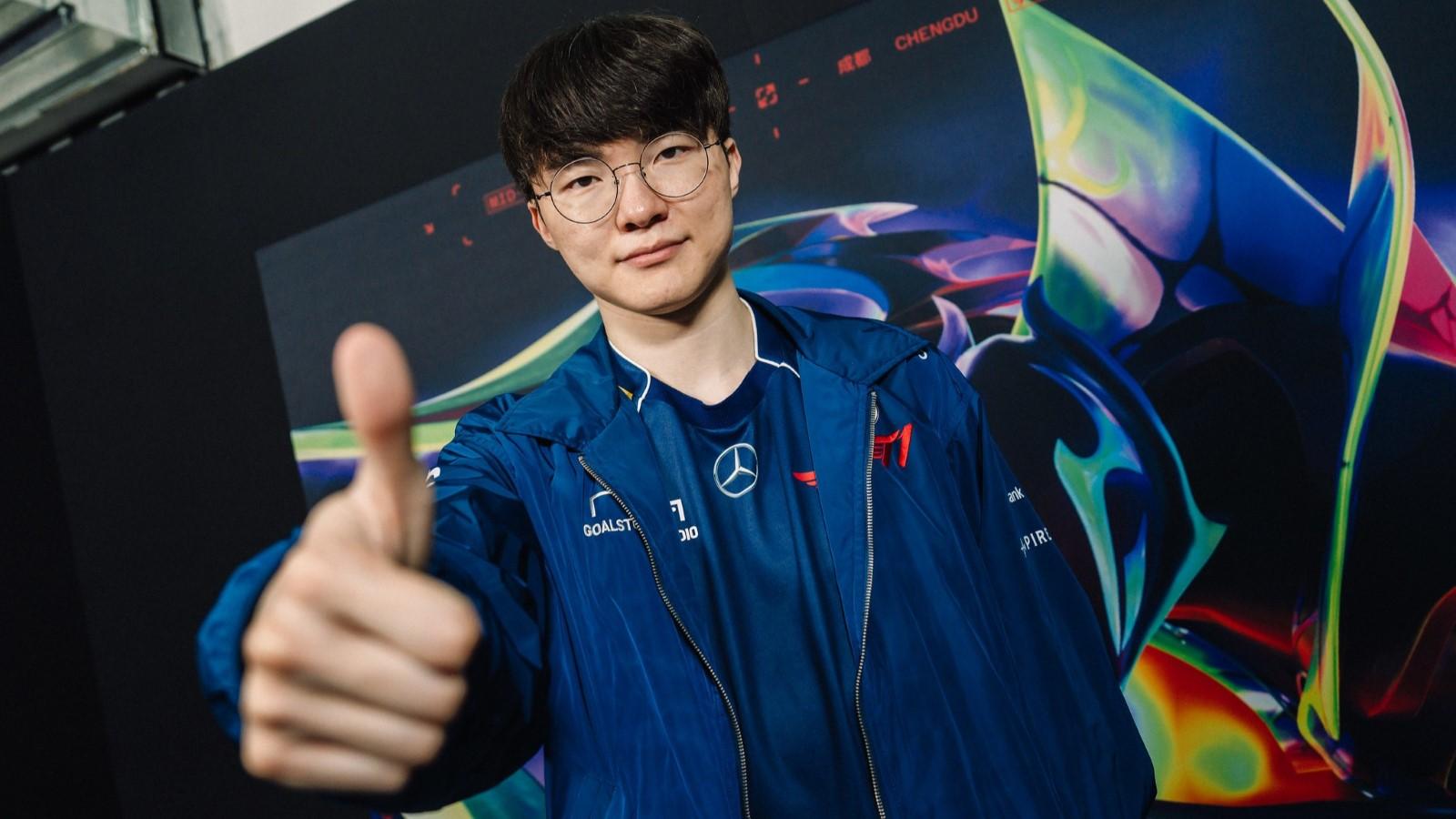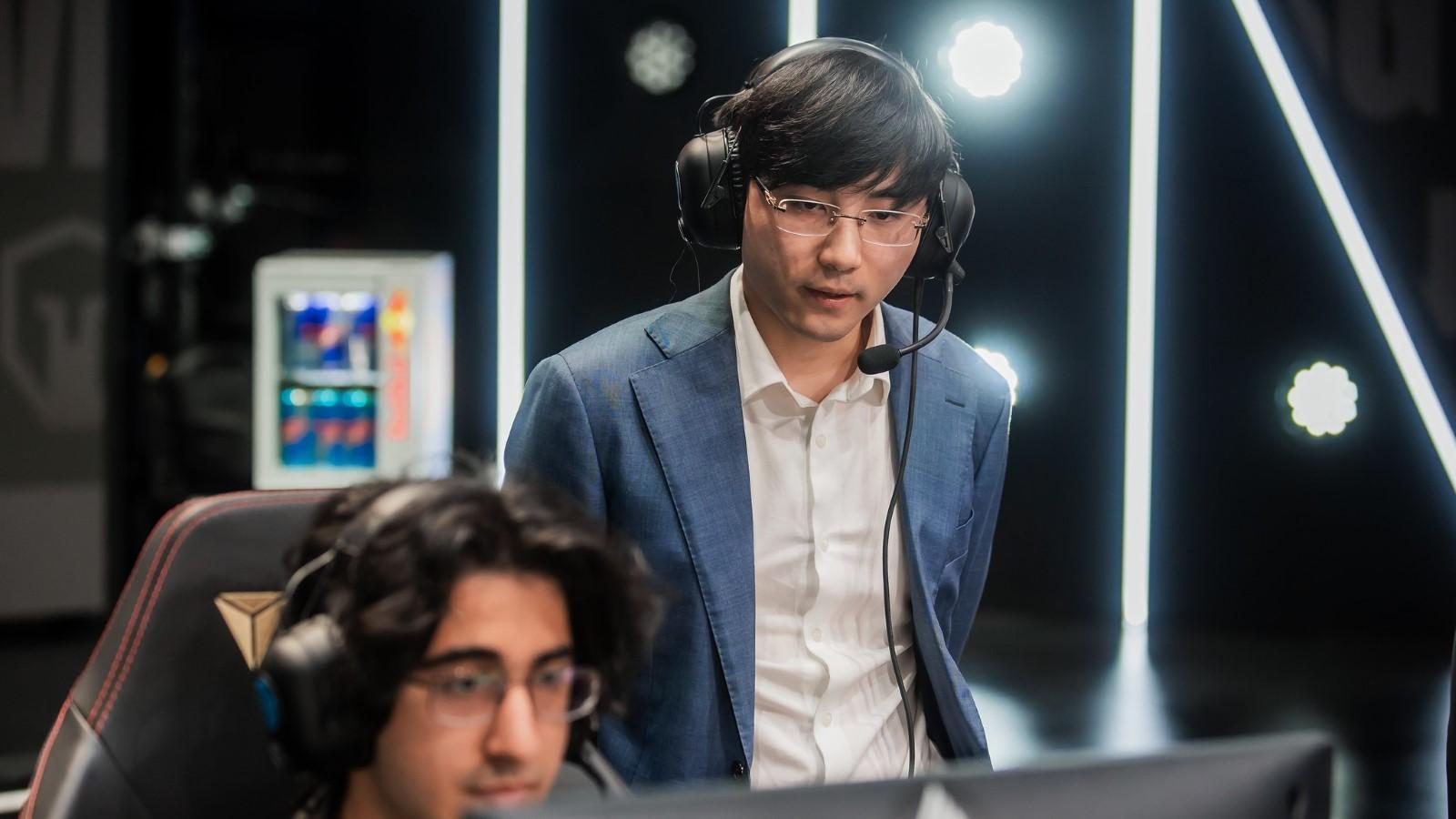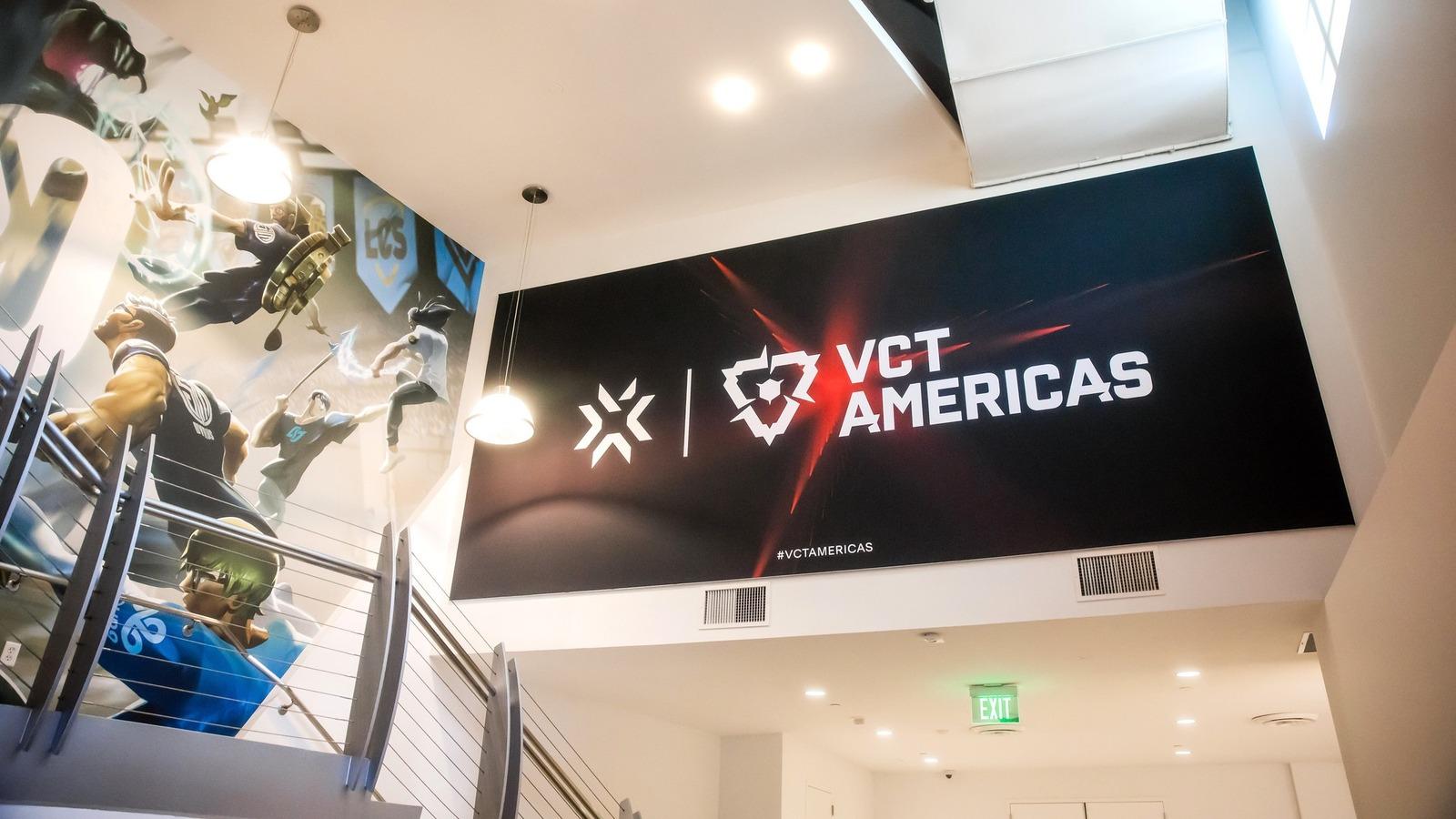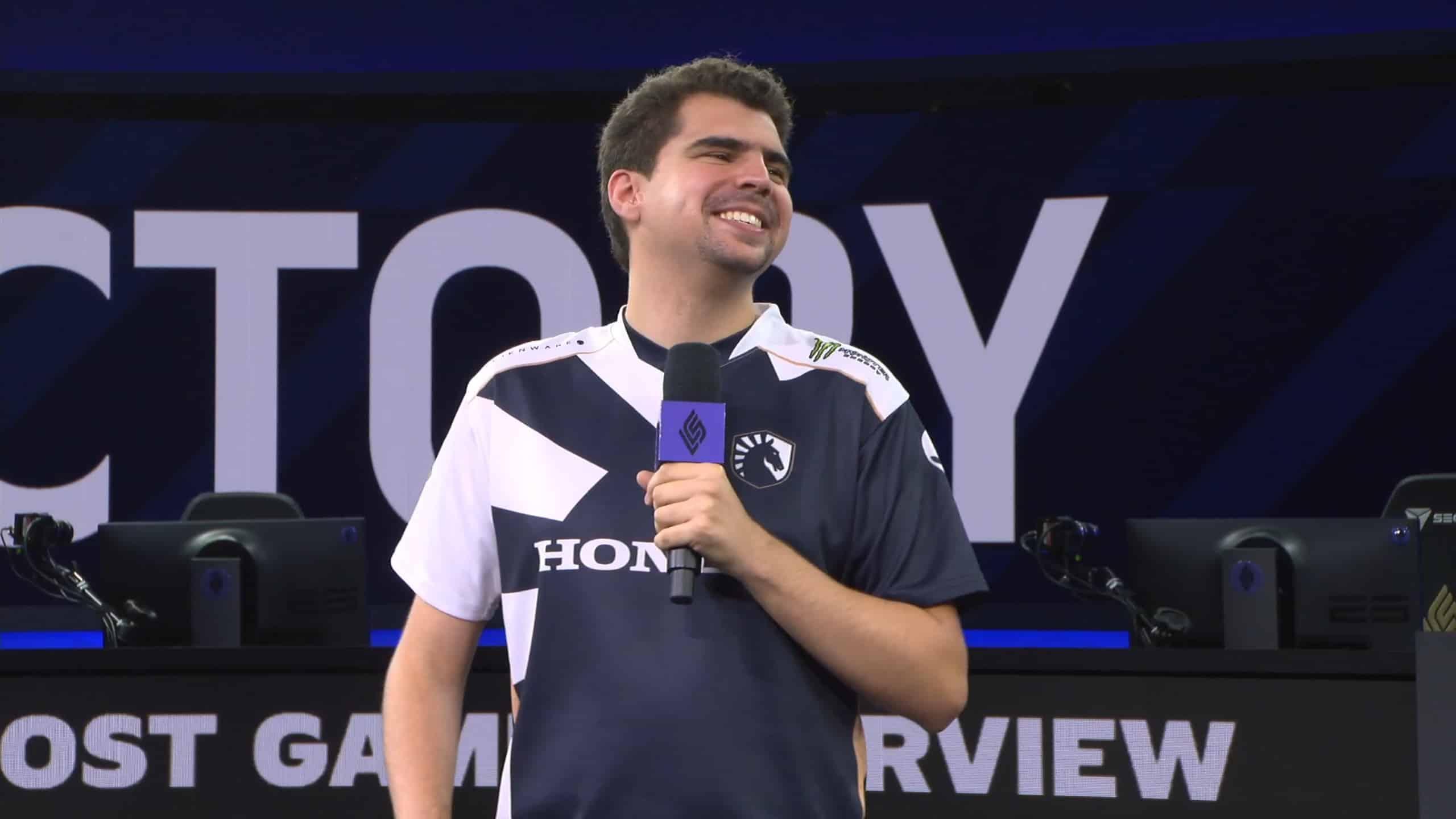Despite FlyQuest’s LCS 2023 failures, Vulcan is motivated to come back better than ever
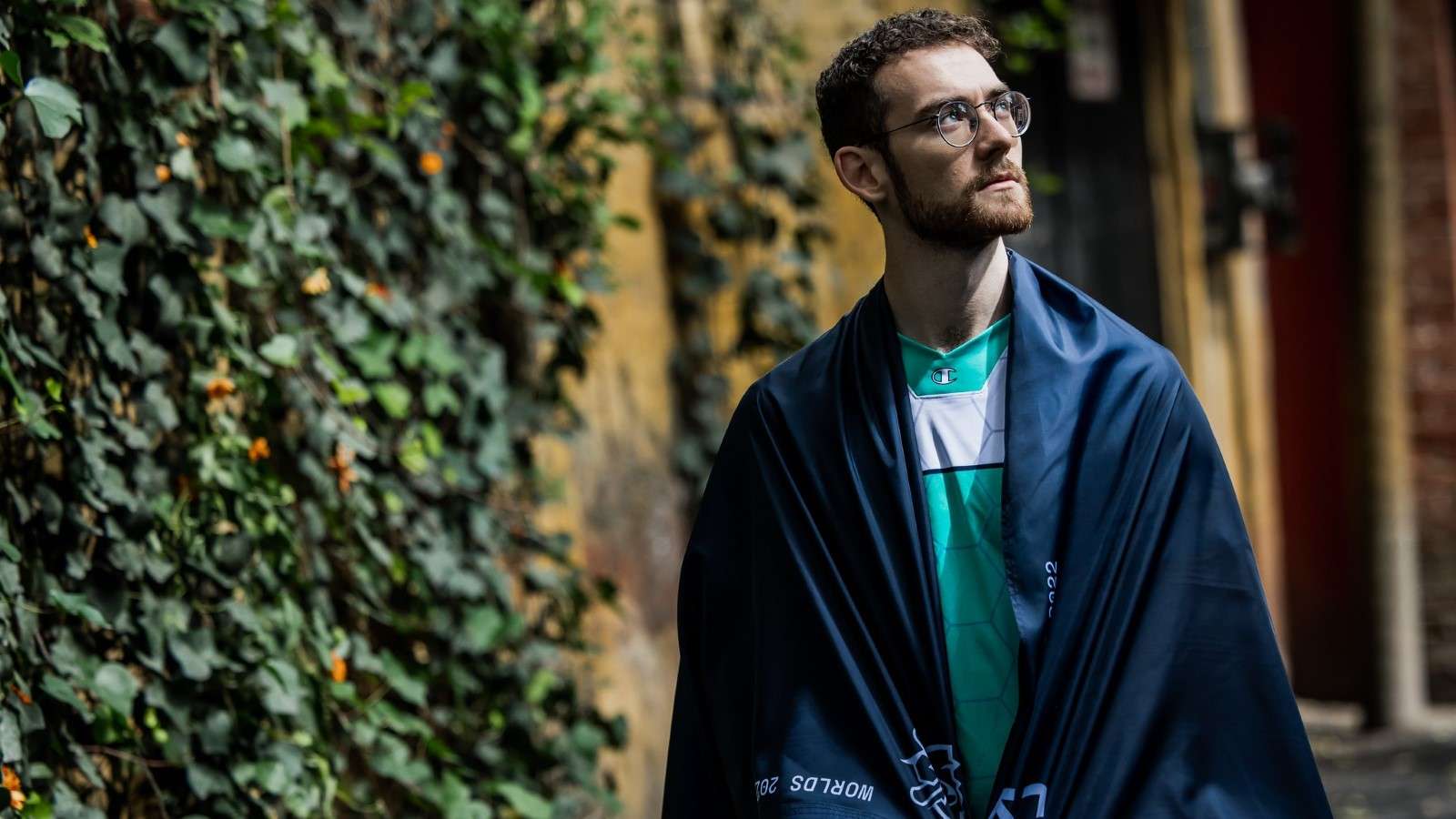 Colin Young-Wolff/Riot Games
Colin Young-Wolff/Riot GamesIn an exclusive interview with Dexerto, Vulcan sat down for an extended chat about what his hopes were going into LCS 2023 Summer, the details behind FlyQuest’s unexpected failure, and how this experience has him determined to come back stronger than ever in 2024.
FlyQuest’s 2023 arc will likely go down as one of the LCS’ most intriguing failures. Their strong showing in Spring with a close third-place finish made it all the more surprising that they ended ninth in Summer.
And, with Philippe ‘Vulcan’ Laflamme being the only member of the main team that was different in comparison to Spring’s lineup, it isn’t all that surprising that many were quick to point their fingers at him when things went wrong. However, as signaled by Vulcan coming into the team off of what was likely his strongest split yet as a player on EG in Spring 2023, there’s certainly more to the story than that.
Fortunately, Vulcan was willing to speak with Dexerto in an exclusive interview about everything that happened in FlyQuest’s season. After everything he discussed and opened up about in regards to his year with the team, one thing was clear: Vulcan isn’t done playing, and he’s looking to reach new highs in 2024.
Leaving EG for greener pastures
FlyQuest’s start in Summer 2023 saw a lot go wrong in a very short time. Between the LCS walkout stalling the season’s start and teams having to play 3 games a week rather than 2 to make up for lost time, teams that were strong shot to the top, while teams that didn’t have a read on the meta plummeted.
That said, Vulcan’s hopes were high going into Summer, and he picked out FlyQuest as the best option for him following EG’s massive shift at the end of Spring.
 Colin Young-Wolff/Riot Games
Colin Young-Wolff/Riot Games“Honestly, it was just the fact that FlyQuest was such a perfect match for both me and the team at the time,” he told us. “They had a pretty good Spring Split result, at least compared to what the org did in the past. And [FlyQuest] had like, genuine belief from both fan sentiment and the team themselves. It felt like they could actually go all the way and win the split. And that’s something that [FlyQuest] hasn’t really had in, I guess, forever.”
Vulcan went on to argue that FlyQuest’s 2020 roster could rival the hype theirs had, but ultimately felt it was pretty hard to argue against 2023’s roster having the highest expectations from both the community and other pro players.
He continued, “The consensus was that support was kind of the worst position on the team in Spring. And I had to find a new team after the EG thing happened, so… That was just the perfect fit for the both of us, and also watching and playing against Prince in Spring. I felt like he was such a monster ADC and the best in the league, and it would be perfect for me to go join him.”
 Marv Watson/Riot Games
Marv Watson/Riot GamesHim referring to the way his time with EG ended as the “EG thing” certainly perked our ears up, and Vulcan told his side of his departure from the org he’d been with before FlyQuest.
“I mean, I do think they decided to lower their budget. So, they traded all the players that had pretty big salaries compared to what they wanted to go for as an org. I guess it makes sense if they want to lower their budget, but it just sucks that I guess they don’t carry through a contract all the way through. But that’s pretty common in esports, right?”
While Vulcan would have been open to sticking with EG and said it “wasn’t out of the question that this EG roster in Spring could have come together and been a lot better in Summer,” he also said it could have gone the other way and been similar to how things turned out for FlyQuest this split. It seemed that a future with EG wasn’t in the cards.
Despite him having earned the first place all-pro vote in Spring for support and being widely regarded as the region’s best support player individually, it was time for a change.
FlyQuest seemed to be the absolute best destination for him, and, at first, that seemed to be the case.
Trouble in paradise
Vulcan’s expectations were sky high going into Summer, and, for the first few weeks he spent with the team, he felt like those expectations were going to be met.
“I’m not picturing stuff so far in the future that much, because, obviously, you’ve got to focus on what’s in front of you. But my expectation was definitely that we’re the best roster on paper in the whole league, and that it was going to be between us and C9, was kind of my my feeling. That we’ll probably meet them in the finals and then have a better series. I think we would come out on top in that situation. So, that was my expectation going into it.”
“The first few scrims in the week that I got there and, when we started practicing as a team, everyone was kind of rusty. So it didn’t go too well. We had a long break and – League players, when you have a long break, you kind of forget how to play competitive League of Legends because you’re just playing solo queue by yourself. All the good habits that you may have built the previous split or the previous years, they kind of – you don’t forget them, but let’s just say you temporarily forget them or have to warm up.”
Vulcan continued, “So, it was pretty disgusting, I’d say, like our first few days of scrims with FlyQuest when I joined. But then we had the whole walkout thing happen, right? Which delayed the start of the season. That made us able to practice a lot more. I mean, we had two more weeks on top of the …maybe two or three weeks before the walkout thing happened? So, in total, we had like over a month of practice. At that point, we were dominating scrims. So we were very, very well back on track.”
“The walkout was something that we felt needed to happen, but we’re still competitors. Playing scrims gets old pretty fast if that’s all you’re doing. You want to go play on stage and show everyone what you’ve been practicing and win games that actually mean something more than showing yourself that you’re improving or that you’re at a certain level. So, we were very excited.”
And then the first week happened.
 Robert Paul/Riot Games
Robert Paul/Riot Games“It was the week that we finally arrived when we were playing on stage, and… we lost every single game the first weekend. At that point, it was like… Okay, I’ve had this kind of thing happen in the past and different teams where you have a very good week of practice beforehand for it. In this case, we had a very good month of practice beforehand. And then you show up on stage and maybe you aren’t used to the pace that’s a little bit different, or the team is a little bit nervous, or something like that, and then it goes wrong, and you lose. That happened three times in a row that week.”
“It was like, ‘Ok you know, there was like a crazy thing that happened that should never happen. We’re much better than that.’ We went into the next week, much more focused, much more… let’s say motivated. Not that we weren’t motivated to practice before but, you know, if you have that kick in the ass that you actually lost on stage to teams that you probably shouldn’t ever lose to. When you’re looking at our roster compared to theirs and our expectations of the split, we don’t want to be dropping those games. So, we had that extra fire in us to go into practice, we kind of leveled up the level of practice that we had. Then we went on stage a second week, and the same thing happened again. We went 0-3 again, and now we were 0-6.”
League of Legends super teams have an unnatural tendency to be cursed, but FlyQuest really got the short end of the stick in this case. They were a team that, on paper, was better than arguably any other team in the LCS based on the skill and track record of its individual players. However, the team was quickly lost, unable to find a clear identity and win condition, and the rushed schedule gave them significantly less time than they would have normally had to right the course.

The team would manage to bring things back quickly with a 3-0 record in week 3, and, while they did massively improve before the split ended as the team began to get their footing, they didn’t manage to get things together in time to qualify for Playoffs. With a final record of 6-12, FlyQuest lost their chance to prove they were the super team that they were built to be.
Not every question has one answer
As it turns out, even Vulcan wasn’t sure what went wrong. At least, not entirely. And asking the simple question of, “What went wrong on FlyQuest?” implicates a lot of other things, making that an impossibly difficult question to answer even for someone who was actively playing on the roster.
You’re not just asking what went wrong; you’re asking why things didn’t work out with Prince, why the team couldn’t get a read on the meta or draft in a way that gave them a consistent win condition, why scrims results weren’t able to translate to stage games – the list goes on. So, it was necessary to slim things down and try to focus on one thing at a time.
Ultimately, we decided to focus on asking about Vulcan’s relationship with Prince and what may have been missing from the duo on stage.
 Robert Paul/Riot Games
Robert Paul/Riot Games“In scrims, me and Prince were generally very good. For the most part, we had a pretty good relationship. I would say that about every one of my teammates, and even the coaches are on FlyQuest in Summer Split. It doesn’t really make sense to me that we would play at such a low level, because we’re both really good players. It’s not like there was something where I hated his guts or he would go up to the office and I’m like, ‘F*** that guy!’ kind of thing, you know? There was nothing like that. So that’s why I’m still, to this day, trying to understand what really happened,” Vulcan lamented.
“You can look at every one of our players – and it’s not something that’s just with the bot lane, right? We were all playing a lot worse than what I think our skills are at. If any of the players that I played with in Summer went on to play with a different team, or stayed on FlyQuest, I would not be surprised at all if any of the players I played with would go and smurf and be all-pro and win the next split in Spring 2024. Because I really think that we had really, really good players in every position. And it’s just such a shame that… Whatever it was that stopped us from being good, whether it’s… I don’t know, maybe our personalities didn’t work too well? Maybe we lacked a certain type of person in the team or in the coaching staff?”
While Vulcan had a number of reasons he could think of as to why things may not have worked out, he believes that it may have ultimately come down to the perfect storm of bad circumstances, a downward spiral that they didn’t manage to break. It’s not as if bad luck was entirely to blame, but it can be really, really difficult to stop a downward trend once it starts.
“I don’t believe that anything happening in competitive, not just in League, but competitive anything comes down only to luck. But… I think it was a little bit unlucky how everything went wrong. Obviously, when something goes wrong, it’s not just luck, right? But, if you look at the whole thing, it’s a bit unlucky that it happened that way. I think, if we had had a better start to the season, and we had been able to build momentum, then there’s no way that a team this talented would finish the way it did.”
 Stefan Wisnoski/Riot Games
Stefan Wisnoski/Riot Games“So, that’s how I kind of make it make sense in my head, that it was a little bit unlucky. But, at the same time, throughout the split, when I saw us as a team or as individuals, the way we would face struggles and trying to overcome those kinds of things or our team problems – I didn’t see a team in those situations that would be able to win the split, you know?
“Even though I believe that everyone was very good, and I believe that maybe we were a little bit unlucky, there was no way that we would have ever been able to win the split. That’s kind of the conclusion I came to at some point throughout the split, when our chances were like very slim of making playoffs, was that there’s still a chance that we can get it together, and be playing at least to the level that we expect from ourselves as individuals.
“At that point, we were all a little bit… desperate in the way we played the game, right? Because, when you’re losing every game on stage, you kind of have that feeling that something’s gonna go wrong eventually.”
“As a player, when you have that feeling, you kind of feel like you have to maybe make a play that’s going to win the game right now, because you don’t want to let the game drag out and increase the chance of something happening where the game is lost because the team makes a mistake, or we misread something and then, like, ‘Oh, s***, we’ve lost it now.’ So you’re like, ‘Okay, like, I need to fight this now. We can’t give this, we have to contest, we have to do that, we have to, we have to, we have to.’ And then you’re kind of like trapped in that mentality, and I think that makes you less calm and less good of a player when you’re playing in that way. I think all of us kind of struggled with that, and that’s why, after a certain point, we were all playing at a much lower level than you would expect from the players that we are, players of our caliber.”
Learning how to win again
Dexerto spoke with Santorin earlier this year, all the way back in Spring 2023. Bear in mind this is when expectations were sky-high for Dignitas, with the organization having renewed expectations after investing heavily in a high tier roster – not dissimilar from FlyQuest’s roster in that respect.
 Colin Young-Wolff/Riot Games
Colin Young-Wolff/Riot GamesSantorin spoke about how they “forgot how to win” at some point when DIG was fresh off ending their 9-game loss streak, and it’s a sentiment that really resonated with Vulcan.
“That’s a statement that would resonate with probably every pro on the planet that plays League. I’d be curious if it’s something that is felt across different competitions, not only League. I wouldn’t be surprised if it was the case. There’s definitely something to that where, when you’re confident with your team and… When you know how to win games – like, you’ll see a champion running across your screen and you see the enemy support show up, and you’re like, ‘Oh, this guy is doing something wrong, let’s just focus on this other thing that’s gonna win us the game.’ When you’re super wired, and your team and yourself knows how to win the game, then you will let that slide and just focus on the thing that is the goal as a team.”
“I feel like, when you forget how to win – all of these little things will pop up on your screen, and you’re like, ‘What the f***?! This guy’s here! Get him!’ And then you stray off the game plan, and the game becomes a lot more chaotic and erratic. You’re not really sure what to do or what’s the game plan. How do you actually convert this advantage you might have? I definitely felt that with FlyQuest this split, where we forgot how to win. It’s not something I’ve never felt before. I’ve definitely felt that kind of thing in other teams before. But… for FlyQuest, I think we forgot how to win for a very long time. It feels like we didn’t really remember how before it was over.”
There’s another element to all of this as well: the language barrier. Prince and VicLa were charming on camera, had a big presence on stage, and quickly picked up English well enough to communicate in-game, but there was still a barrier there. Communicating more complex thoughts and feelings outside of the game can be difficult.
 Marv Watson/Riot Games
Marv Watson/Riot Games“League is the kind of game where the language is mostly English. For Korean players, they know fight, back, Baron, that kind of thing. People use pings. If you’re doing well, you don’t necessarily need to be able to communicate super well with the same language. The problem is, once you’re not doing well and you need to be able to communicate with one another with your perspective, or what you want, or what you’re frustrated with the other person about, then that’s where the language barrier becomes a much bigger problem. You’re not able to understand why he did a certain thing, or what he expects from you. How he’s feeling.”
“We had moments in the team where we were all feeling terrible, meetings where we were talking about our feelings. I cried in a few of those meetings. We were in positions in the split where we should never be, where we obviously never want to be. That’s the most important thing when you’re in the split, right? There’s nothing that comes close to it: You have to be able to win games. We’ve all scarified a lot of things to be there, so it can be very emotional when it doesn’t go well. If you don’t communicate very well, in those moments, it would hurt. But I wouldn’t blame us doing so poorly on it.”
Finding a way forward
Even after a split like the one he had, Vulcan is looking to the future and is in talks with multiple teams. He may stick in North America, he may go to Europe; either way, he’s got his eyes on a title next split despite his ninth-place finish to end 2023, and he’s got a big goal he’d like to accomplish before he retires.
“I don’t have the most titles as a North American support. Biofrost currently holds that that title with four trophies. I’m at three. So that’s maybe my biggest motivation to keep playing, I want to be I want to be the one with the most trophies in my position, at least as a North American. It’s something I really want, and whether that’s, you know, three NA trophies and two EU trophies, that would work too. Or if it’s five NA trophies, that works as well.”
Additionally, Vulcan wants to put the West on the map internationally. Whether that’s playing in Europe or in North America, he still has a desire to upend the notion that Western teams will never best those coming from the LPL and LCK.
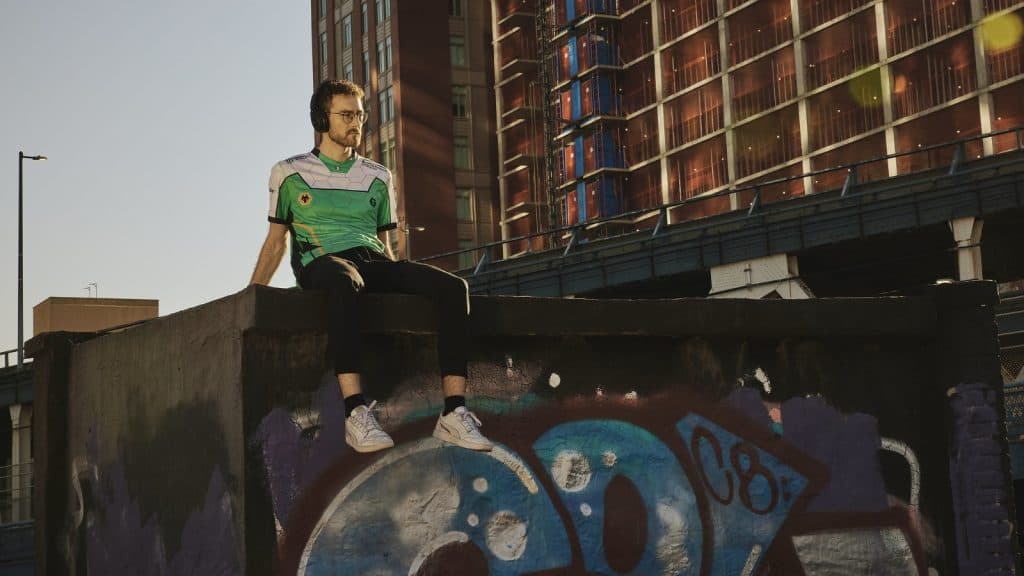 Lance Skundrich/Riot Games
Lance Skundrich/Riot Games“The last few international tournaments that I’ve played I didn’t look very great, or didn’t do very great individually. I don’t want people to remember me as someone who can’t compete internationally, because I think that’s not true. I think I have what it takes to compete with the best in the world, and I think that’s something that any player who plays professionally should believe, otherwise, what are you doing, you know? I truly believe that I can compete against anyone. I don’t want to have my last few international tournaments with me getting remembered as someone who can’t compete.”
Vulcan’s exploring a number of off-season offers, as any other high profile pro player would, including the idea of sticking with FlyQuest and going over to Europe. He still had clear affection and appreciation for the players he was with in the tail end of 2023, and, though the results weren’t great, the team had less than 2 months to figure out how to come up with a winning strategy, and it could be well worth having another go at it. Then again, the LEC could potentially push him to be better and give him a stage to show just how good he is. It’s a difficult decision.
Considering Vulcan’s strong track record as a player, he doesn’t believe that his disappointing split with FlyQuest in 2023 will define him as a player.
“I think, for the most part, people will be able to look past it because I think I’ve been lucky enough to play on very good teams for my whole career, and being able to perform at a high level for most of it. I feel like I’ve proven that, even though I didn’t play well in Summer and I really did int a lot of those games away, that this is not the kind of player I am, right? That this is the outlier. And so, I think people are able to look past it.”
 Robert Paul/Riot Games
Robert Paul/Riot GamesVulcan’s still committed to competing at the end of the day, hoping that what he learned from the last year of play can really elevate him to the next level as a player. This year has changed the way he looks at what a successful roster is.
“The takeaway I get from this year is that team culture is a lot more important than I believed it to be. You need 5 players who are able to buy into the coach’s vision of the game, preparation outside the game, how we talk to each other, how we behave in the practice room, all that stuff, I think that’s very important. You need to be able to care a lot about your teammates when you go on stage and play. Because, if it’s only a job and you’re not friends with your teammates, then it becomes harder to have each others’ backs.”
“When you’re on stage or you’re in an interview and someone asks a question, and… you definitely don’t want to have a team where you’re throwing each other under the bus. Not that this happened this year, it just got me thinking. I think that’s the kind of thing that can happen when you don’t have a team culture that’s super healthy, or everyone’s bought in and they have your back. The team is above everyone else, that’s most important. The unit. No one comes before that. I think that was the problem with EG in Spring, that we weren’t very much a team. Fly wasn’t so much that, I think the culture was fine. Fly is still a mystery to me, and probably to everyone on the team.”
